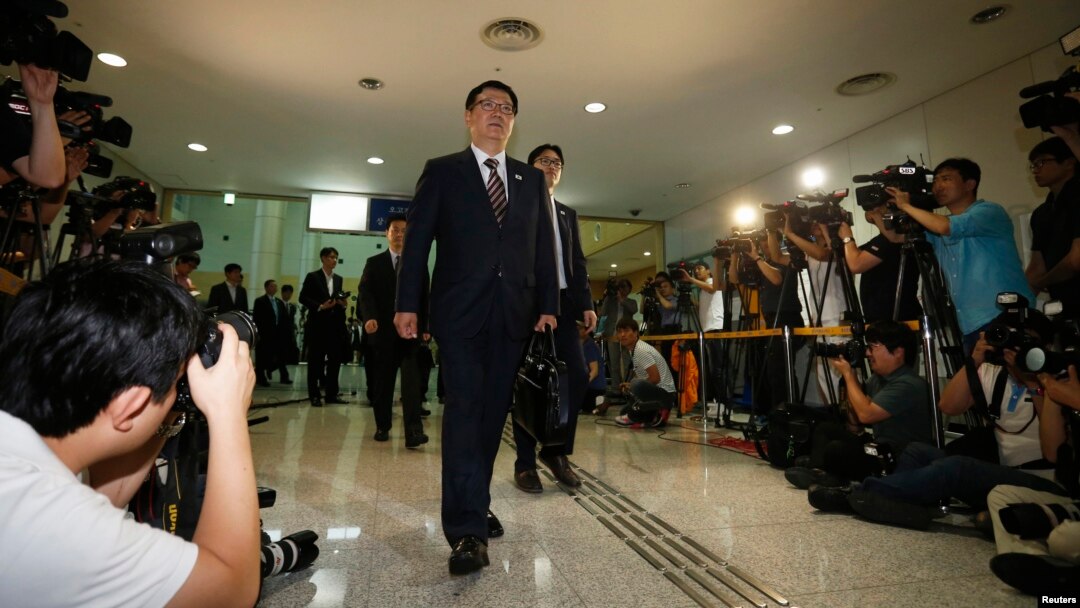South Korea and North Korea have begun a fresh round of talks aimed at re-opening a joint factory complex that recently fell victim to increased military tensions.
Seoul's Unification Ministry said the low-level talks began Wednesday at the Kaesong industrial park, which lies just north of the demilitarized zone separating the countries.
Su Ho, the Unification Ministry official heading the South Korean delegation, said before crossing the border that he is optimistic about the talks.
"We will make efforts to normalize operations at the Kaesong industrial park through a mutual agreement which will be based upon a trust-building process for the Korean peninsula as well as adherence to international rules," he said.
The two sides on Sunday held a tense, 15-hour meeting where they agreed to take steps to re-open the eight-year-old facility that serves as an important barometer of Korean relations.
It has been closed since April, when North Korea pulled its 53,000 workers as part of an angry response to international sanctions against its latest nuclear test. Seoul demanded its workers leave in early May.
It is not known how long Wednesday's talks will last, but many analysts expect slow progress, as both sides have given indications they are far apart on a number of issues.
South Korean officials say they want assurances that operations at the complex will continue even during future periods of heightened tension. They also want the North to give South Korean businessmen better access to the facility.
Earlier Wednesday, a group of South Korean businessman and officials visited Kaesong in order to inspect equipment and retrieve materials, which could be damaged by the current rainy season.
Kaesong is the last remaining symbol of cooperation between the two foes, and is seen as a bellwether of Korean relations. Although work at the center has been suspended during times of heightened tensions, it has never been shut down completely since it was established in 2004.
The complex, which relies on South Korean know-how and cheap North Korean labor, was a key source of hard currency for the North's troubled economy.
Seoul's Unification Ministry said the low-level talks began Wednesday at the Kaesong industrial park, which lies just north of the demilitarized zone separating the countries.
Su Ho, the Unification Ministry official heading the South Korean delegation, said before crossing the border that he is optimistic about the talks.
"We will make efforts to normalize operations at the Kaesong industrial park through a mutual agreement which will be based upon a trust-building process for the Korean peninsula as well as adherence to international rules," he said.
The two sides on Sunday held a tense, 15-hour meeting where they agreed to take steps to re-open the eight-year-old facility that serves as an important barometer of Korean relations.
It has been closed since April, when North Korea pulled its 53,000 workers as part of an angry response to international sanctions against its latest nuclear test. Seoul demanded its workers leave in early May.
It is not known how long Wednesday's talks will last, but many analysts expect slow progress, as both sides have given indications they are far apart on a number of issues.
South Korean officials say they want assurances that operations at the complex will continue even during future periods of heightened tension. They also want the North to give South Korean businessmen better access to the facility.
Earlier Wednesday, a group of South Korean businessman and officials visited Kaesong in order to inspect equipment and retrieve materials, which could be damaged by the current rainy season.
Kaesong is the last remaining symbol of cooperation between the two foes, and is seen as a bellwether of Korean relations. Although work at the center has been suspended during times of heightened tensions, it has never been shut down completely since it was established in 2004.
The complex, which relies on South Korean know-how and cheap North Korean labor, was a key source of hard currency for the North's troubled economy.



